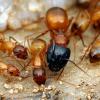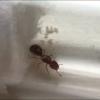I am looking to get some hydrostone to absorb/transfer water in a dirt formicarium, however I have access to a lot of Plaster of Paris (a quick setting gypsum plaster), the stuff dentists use. Does anybody know if there are any significant differences, or used plaster of paris? Thanks!
- Formiculture.com
- Forums
- Gallery
- Members
- Member Map
- Chat















